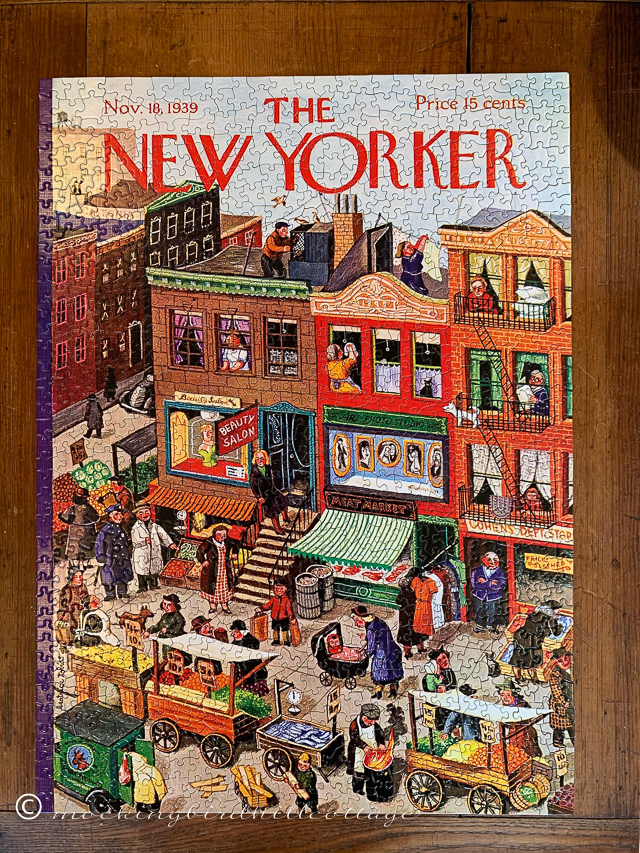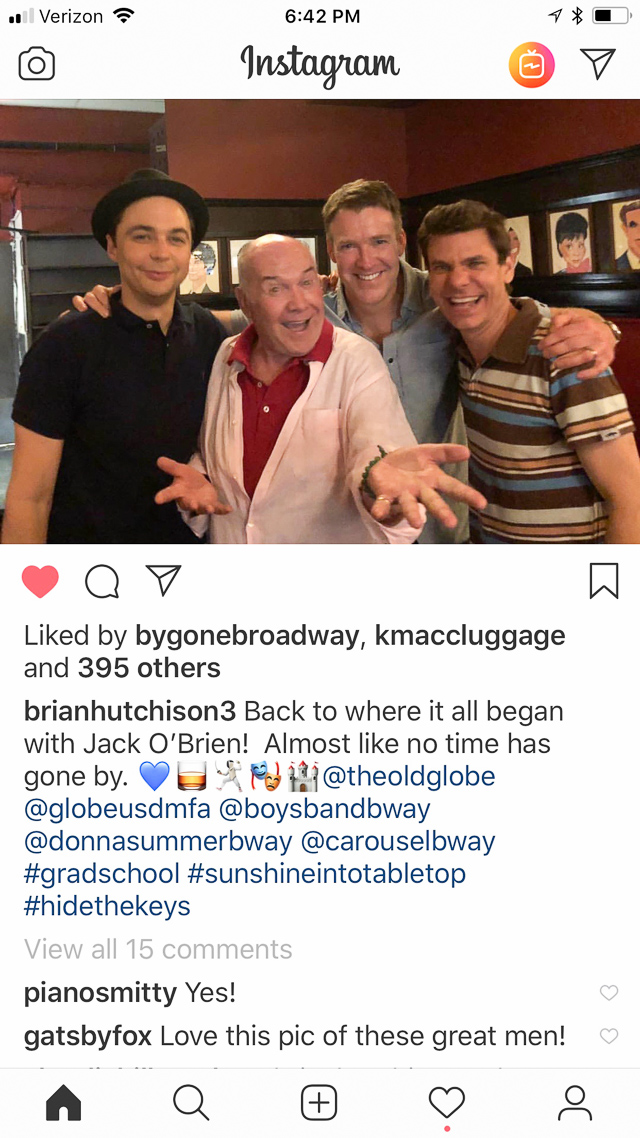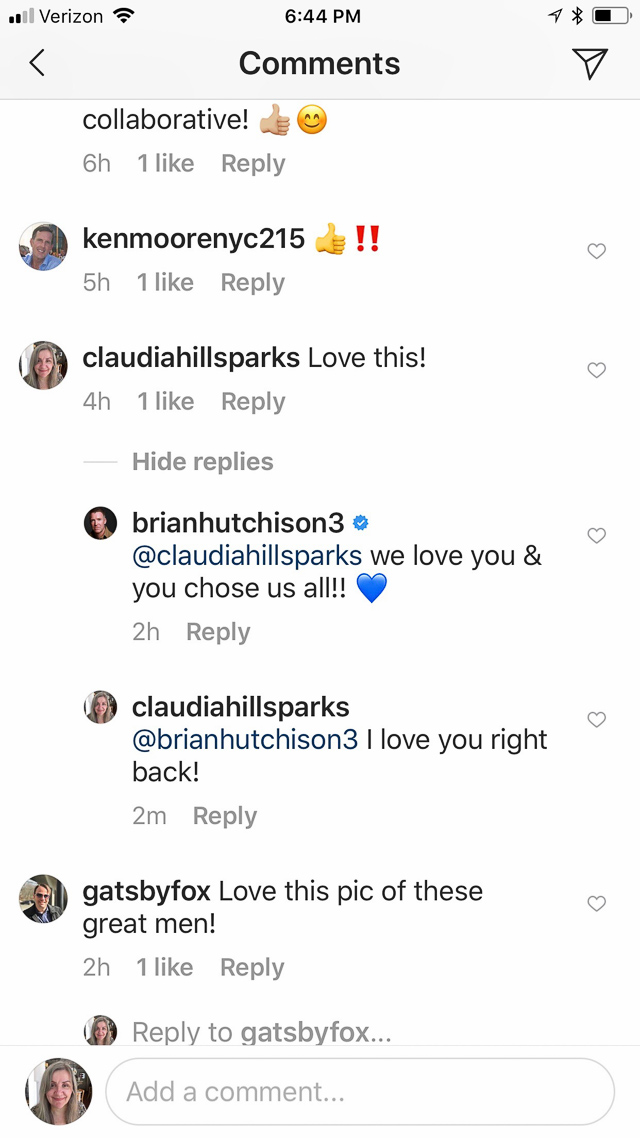
The forsythia that grows in the woods. On our property, thankfully. We used to think it was on our neighbor’s property. This photo doesn’t do it justice; this year the yellow is quite vivid and gorgeous.
A longtime reader of the blog, Suzanne, sent me a message a while back with some ideas for blog posts:
“If you find a day when you can think of nothing to write about, I’d love to hear stories from your time in the theater. I’d love to know how you learned dialects and how you teach them. What does a dialogue coach actually do? What is it like (thinking of Don in M’ville) performing the same show so many times? Did he have any famous visitors backstage? Well, I could think of a zillion questions I could ask and I bet your readers would be fascinated by your theater knowledge and memories.”
I wrote about some of this before, but I forget sometimes that the blog is over 13 years old and many of you weren’t around here back then. I so appreciate your suggestions, Suzanne, and I’ll try to write about these things on occasion.
First up: How did I end up doing what I do? Part One.
I was an actress for many, many years and moved to Philadelphia to get my MFA in Acting from Temple University in the early eighties. It was a three-year program. That move changed my life. It saved me. (Side note: I’ve always had a good ear and could mimic dialects at a young age. I take no credit for my ear. I do take credit for developing it over the years.) In the course of the three years, one of my classes was Voice and Speech and I started to learn more about the actor’s voice, articulation, the International Phonetic Alphabet (IPA) and dialects. I discovered that you can learn and coach any dialect if you a) have a good ear and b) know how to transcribe sounds and sound changes using IPA, so that anyone who is familiar with IPA can look at a transcription of the phonetic changes in speech from, let’s say, standard American speech to Italian and begin to figure out how to make those sounds. Of course, there’s also musicality, tempo, placement as well. That’s why having a good ear is terribly important. And having a good coach, as well.
During the last year of the program, we had to teach a class to undergraduates. We were assigned those classes and my friend Cynthia and I were assigned Voice & Speech. I really enjoyed it and I began to rediscover my love of teaching. After graduation, I stuck around Philly because I was acting at the Wilma Theater there and supporting myself by temping in an office. It didn’t take long for me to realize that I wanted to teach – at the age of 33, I no longer found the idea of competing for acting roles and living in a closet in NYC attractive. But I did want to teach. So I started the long process of applying for a teaching position in a university. In those days there was no internet. The only way to see job listings was through a publication called ArtSearch. I was poor at the time and was just getting by, and my good friend Richard, who studied costume design at the same time I was studying acting, gave me a subscription for Christmas. I thank him daily for that generous gift.
I started to apply – I had no experience except my time teaching in grad school and a class I taught at the Wilma – so I was prepared to accept any job, anywhere. In most cases, I heard nothing back. But I did hear from the University of North Carolina School of the Arts, a very well known professional training program. For some reason, they wanted to interview me. (I would have been happy in a drama program, but a professional training program? That was a dream!) I flew down to Winston-Salem, went through the insanity that is an interview; meeting tons of people, smiling so much my face ached, teaching a short class, watching other classes, and being interviewed by the Search Committee. It was a wonderful program. I am not a Pollyanna by any means, but conversations that I had, and in particular, one I had with a member of the voice faculty as he drove me to the airport, left me feeling that I had the job. I mean, it was so overwhelmingly positive and in so many words, I was definitely led to believe the job was mine.
I returned to Philadelphia and a couple of weeks later, Meredith came to visit me for Memorial Day weekend. When I picked up the mail that Saturday, there was a thin envelope from North Carolina. Too thin. I opened it up and found I didn’t get the job. The message was that they loved me and had wanted me but someone else got it. Most likely it was someone they’d already decided to appoint, even though they were required to do a search. That happens. They said if there ever was another opening, they would strongly consider me.
I was devastated. Searches happen in the spring and this meant that I would have to go through another year of working in an office before I could apply again. I cried all weekend long. Thank heavens, Meredith was there.
Fast forward to about a week or two later (I can’t quite remember how much time had gone by but it wasn’t much.) I was walking home from work and I was pretty low. I stopped on the street and said out loud, “God, I don’t know what to do. I give up. I surrender.” And I truly did. I let go. I was powerless.
I walked in the door of my third floor walk-up and there was a message light blinking on my answering machine. It was from someone I didn’t know: William Lacy, the acting head of the BFA Theater Training Program at Boston University. He said he’d like to talk to me about a job opening that came up suddenly – after the official search season. When the opening came up, he had called his colleagues around the country and North Carolina School of the Arts had highly recommended me. BU was going to do a shortened search with about three candidates. Would I be willing to fly up for an interview? Of course!
A few days later, I flew to Boston, met Bill and some students who were still in town, as well as two other members of the Voice & Speech faculty, Bob Chapline and Rick Winter. I taught a short class in learning a Spanish dialect to the students, Bob, Rick, and Bill. I had my interview and then I flew back home the same day.
I got the job. A month or so later, I moved to Boston and started to teach Speech and Dialects.
And my life changed forever. Everything that has happened to me professionally in the years to come would never have happened without that job. Never. I met Rick there. I met the new chair of the program, Bob Morgan, who I remain close to to this day. (Both of them had ties to Jack O’Brien and the Old Globe, but that’s another story for another day.) I learned so much at BU. It remains my favorite job ever.
You never know what will happen. I thought things were hopeless. But the job that I didn’t get led directly to the job I did get. A job that ended up being far, far better for me.
Oh, puzzle done:

Stay safe.
Happy Monday.






